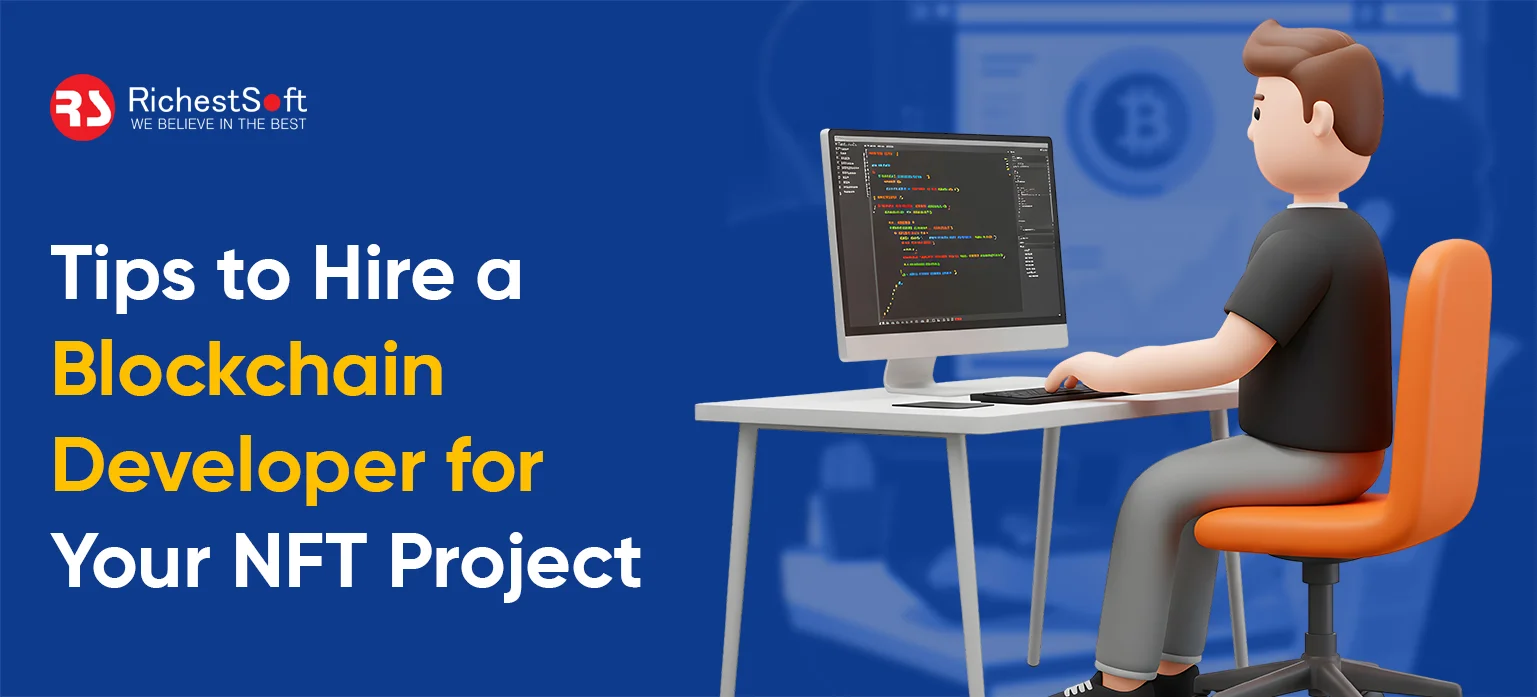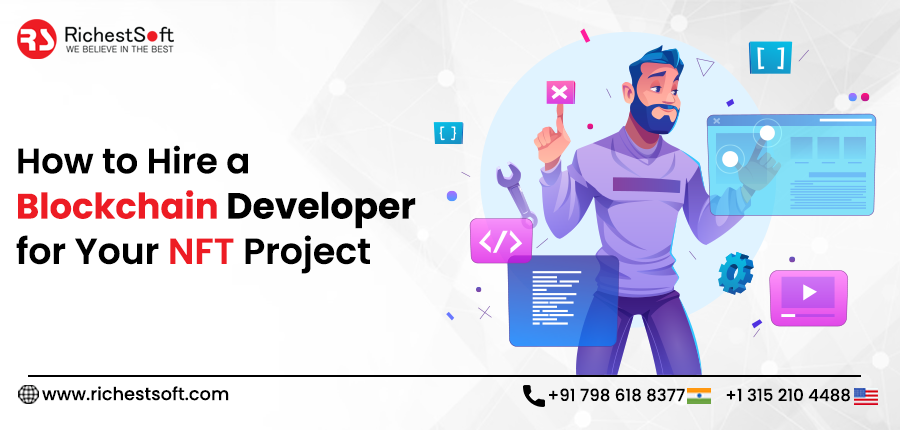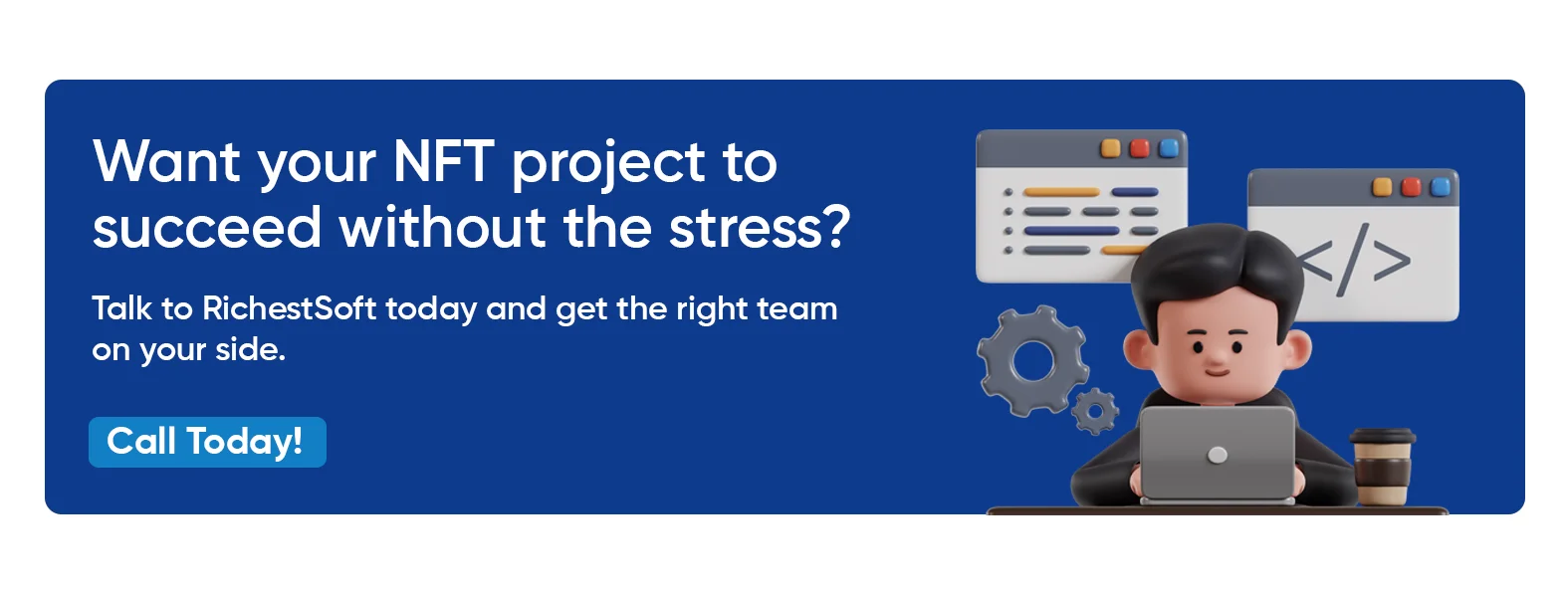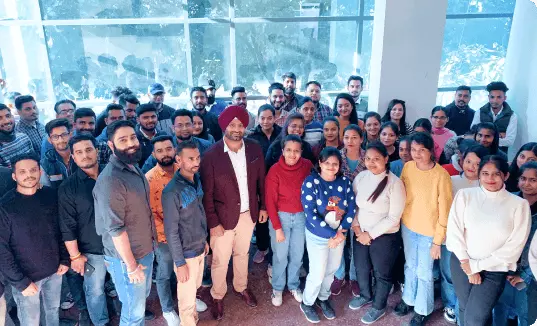September 30, 2025
NFTs have been around the news for a while, but most people still don’t really understand what it takes to make one work for a business. Companies aren’t just launching hype projects anymore; they’re trying to use NFTs in ways that actually matter: loyalty programs, digital collectibles, game items, even tokenized ownership of real things. The tricky part? None of that works without the right technical guidance.
You need a Blockchain Developer for your NFT Project who not only knows the code but also understands the risks, the costs, and how all the pieces fit together. Get the right person, and your project can run smoothly. Get the wrong person and you can end up with delays, security problems, or a project that never really launches.
So how do you actually find someone who fits? Continue reading this blog to learn how to hire a Blockchain Developer in NFT Projects who can turn your NFT idea into something real.
Tips to Hire a Blockchain Developer for Your NFT Project

1. Start With Your “Why”
Before you even start hunting for a Blockchain Developer for your NFT Project, get clear about what your business is actually trying to achieve. Are you building:
- A full NFT marketplace?
- A brand-focused digital collectibles drop?
- Game integrations with tradable assets?
- Tokenization of physical items like property or luxury goods?
Each use case demands a different level of expertise. For example, launching a one-off collectible series may only require a strong smart contract developer. But a full-fledged marketplace will need a team that covers blockchain, front-end development, scalability, and security audits.
A surprising number of companies skip this step and end up hiring someone with the wrong background.
2. Skills Really Matter
Blockchain development has its own set of essentials. Here’s what you should look for:
- Smart Contract Development: Mastery of Solidity (Ethereum/Polygon), Rust (Solana), or Cadence (Flow).
- Understanding of Standards: Knowledge of ERC-721, ERC-1155, or other relevant token formats.
- Security Practices: A developer who doesn’t talk about audits and test coverage should be a deal-breaker.
- Integration Know-How: Connecting wallets, APIs, and payment systems is often just as important as the contract itself.
- Scalability Awareness: Can they balance user experience with costs, especially when gas fees fluctuate?
A qualified developer should be able to walk you through past projects and explain the trade-offs they made.
3. Experience & Expertise
In blockchain, experience speaks louder than theory. Don’t just rely on resumes. Ask for:
- Code Samples: A peek at their GitHub will reveal coding habits quickly.
- Project Walkthroughs: Get them to explain how they approached a past NFT launch.
- References: Speaking to previous clients will highlight reliability as much as technical skill.
For instance, if a developer can describe how they solved issues like gas optimization during a high-volume mint or secured a contract after an attempted exploit, that’s gold.
4. Decide on Your Hiring Model
Companies usually face three choices:
- Freelancers: Good for small, contained projects. Affordable, but limited in scalability and support.
- In-House Developers: Best if you’re planning a long-term blockchain strategy, though recruitment takes time and comes with overhead.
- Agencies or Development Partners: Offer complete teams with project managers, testers, and security auditors. Often, the most practical choice for businesses entering the NFT space without prior blockchain experience.
There’s no single “best” option; it depends on your budget, timeline, and appetite for risk. But if the project is mission-critical, many executives prefer agencies because they reduce the dependency on one individual.
5. Security Isn’t Optional
The NFT world is vulnerable to numerous risks, including multimillion-dollar losses resulting from poorly written contracts, marketplaces being compromised by exploits, and brands facing backlash after user funds are compromised.
This is why security must be part of the conversation from day one. Your developer should know how to:
- Run internal and external audits.
- Protect against common attack vectors, such as re-entrancy or overflow errors.
- Build with upgradability in mind, so contracts can adapt without exposing vulnerabilities.
Skipping this step isn’t saving money; it’s inviting risk.
6. Business Knowledge
A blockchain developer who can only code is half the picture. The stronger candidates also understand how NFTs fit into commercial models.
Ask them questions such as:
- “If transaction fees spike, what’s your plan to keep the experience affordable?”
- “How would you design an NFT program that keeps users engaged after the first drop?”
- “What would scaling from 5,000 to 500,000 NFTs actually look like?”
The answers will show whether they think like a partner or just a contractor.
7. Communication Is a Hidden Factor
NFT projects are never a one-person show. There are designers, marketers, compliance folks, community managers—all sorts of people involved. If your developer can’t explain technical stuff in plain language, working together is going to be a headache.
During interviews, notice how they explain concepts. Can they describe ERC-721 in a way a non-technical colleague can understand? Do they answer questions with patience? These small signs matter because technical skill without communication often leads to roadblocks later.
8. Cost Versus Value
Yes, blockchain talent is expensive. But choosing the cheapest option often ends up costing more. A poorly written contract that needs rework or worse, exposes you to a breach and can wipe out any short-term savings.
Instead of focusing only on hourly rates, consider long-term ROI. Paying for experience usually saves money by preventing expensive failures.
Conclusion: Why Hire RichestSoft
Hiring a blockchain developer for your NFT project isn’t like filling a normal role. Honestly, it can go sideways really fast if you make the wrong choice. Projects can get stuck for weeks if a developer misses even a small but important detail. On the flip side, the right team can keep things moving more smoothly than you might expect.
That’s where RichestSoft comes in. The company offers NFT software development services and has created NFT platforms tailored to various types of businesses. We handle everything from smart contracts to marketplaces, plus all the security stuff that nobody wants to think about until it becomes a problem.
The tricky thing about NFTs is that code isn’t enough. There are small, unexpected issues that arise when real users begin interacting with your platform. A partner like RichestSoft knows those pitfalls and can help you get past them without the panic. You get the tech, yes, but you also get confidence that the project won’t collapse the first time someone hits “mint.”
 +1 315 210 4488
+1 315 210 4488 +91 99888 06489
+91 99888 06489








